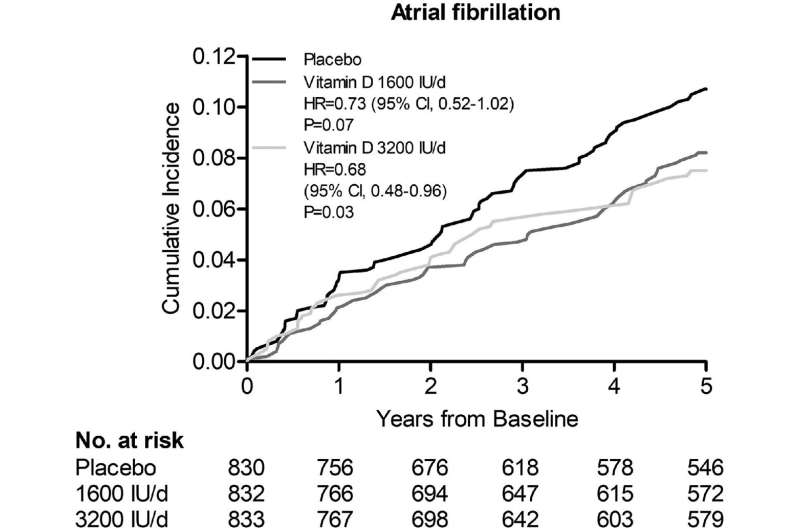This article has been reviewed according to Science X's editorial process and policies. Editors have highlighted the following attributes while ensuring the content's credibility:
fact-checked
peer-reviewed publication
trusted source
proofread
Taking higher-than-recommended doses of vitamin D for five years reduced the risk of atrial fibrillation, finds study

Taking higher-than-recommended doses of vitamin D for five years reduced the risk of atrial fibrillation in older men and women, according to a new study from the University of Eastern Finland.
Atrial fibrillation is the most common arrhythmia, the risk of which increases with age, and which is associated with an increased risk of stroke, heart failure and mortality. Vitamin D has been shown to have an effect, for example, on the atrial structure and the electrical function of the heart, suggesting that vitamin D might prevent atrial fibrillation.
Conducted at the University of Eastern Finland in 2012–2018, the main objective of the Finnish Vitamin D Trial, FIND, was to explore the associations of vitamin D supplementation with the incidence of cardiovascular diseases and cancers. The five-year study involved 2,495 participants, 60-year-old or older men and 65-year-old or older women, who were randomized into three groups: one placebo group and two vitamin D3 supplementation groups, with one of the groups taking a supplement of 40 micrograms (1600 IU) per day, and the other a supplement of 80 micrograms (3200 IU) per day.
All participants were also allowed to take their personal vitamin D supplement, up to 20 micrograms (800 IU) per day, which at the beginning of the study was the recommended dose for this age group. At baseline, study participants had not been diagnosed with cardiovascular disease or cancer, and they completed comprehensive questionnaires, both at the beginning and throughout the study, on their lifestyles and nutrition, as well as on risk factors of diseases and disease occurrence.
Data on the occurrence of diseases and deaths were also obtained from Finnish nationwide health registers. Approximately 20% of participants were randomly selected for more detailed examinations and blood samples.
During the five-year study, 190 participants were diagnosed with atrial fibrillation: 76 in the placebo group, 59 in the 40 micrograms group, and 55 in the 80 micrograms group. The risk of atrial fibrillation was 27% lower in the 40 micrograms group, and 32% lower in the 80 micrograms group, when compared to the placebo group. In the sub-cohort selected for more detailed examinations, the mean baseline serum calcidiol concentration, which is a marker of the body's vitamin D concentration, was relatively high, 75 nmol/l.
After one year, the mean calcidiol concentration was 100 nmol/l in the 40 micrograms group, and 120 nmol/l in the 80 micrograms group. No significant change in the calcidiol concentration was observed in the placebo group.
FIND is the first randomized controlled trial to observe that vitamin D supplementation reduces the risk of atrial fibrillation in generally healthy men and women. Previous research is limited to only two randomized trials, which did not observe an effect when using doses of 10 micrograms (400 IU) or 50 micrograms (2000 IU) per day.
Further confirmation of the present results from the FIND study is therefore needed before doses of vitamin D that significantly exceed current recommendations can be recommended for preventing atrial fibrillation. The FIND study has previously published findings showing no association with the incidence of other cardiovascular events or cancers.
The findings are published in the American Heart Journal.
More information: Jyrki K. Virtanen et al, The effect of vitamin D3 supplementation on atrial fibrillation in generally healthy men and women –the Finnish Vitamin D Trial, American Heart Journal (2023). DOI: 10.1016/j.ahj.2023.05.024




















